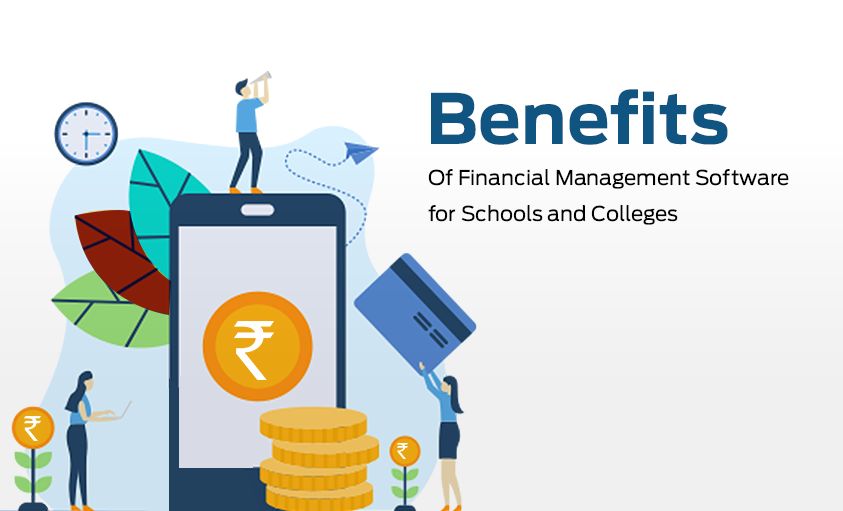
Managing finance in an educational institution, whether it has one campus or 10 is critical. The bigger the institution, higher the complexity and larger the volume of data. Paper or even excel files can no longer meet up with the challenge. Institutions that have switched over to an integrated financial management system are realizing the benefits of a good education ERP to perform and track all financial activities through one system. Transparency in the times of regulated GST is essential and speeding up the process by taking away manual entries is the need of the hour.
What is a Management Information System (MIS)?
All financial details can be managed from a single platform i.e. the Accounts Module integrated within the Educational Management Information System (EMIS). Data gets fed into the Accounts Module in real-time from different financial transactions such as fee management module, hostel management module, payroll management etc. What this translates into is a communication between different systems to create one single view. For example, entries are automatically made into the accounts module from the fee payment module. In older systems, all these modules would have been stand-alone modules and would require separate entries to be made.
Reports are always up to the minute and visible only to those authorised at different levels to view them. The biggest advantage is that reports are generated at just a click. Previously, financial reportswould take weeks using multiple staff. Now, an integrated education ERP cuts down these man-hours to just a few seconds. This is particularly important for colleges aiming for NAAC and AICTE accreditation.
Also read: NAAC: All You Need to Know About the Accreditation Process
Finance, Accounting and Revenue Modules
Using a fee management or financial management software is now enabling schools and colleges to connect various departments such as admissions, finance, hostel, cafeteria, library and transport. It is up to the educational institution to decide on what modules they need included or which they can leave for a future integration.
The modules that are available in a full-blown financial management system are
1. Fee management: Fee management software allows an institution to customize the fee structure based on their specific requirements. The ability to set discounts, collect penalties for late payments, automate alert notifications as well as integrates with the college website to allow for online payment of fees.
2. Student accounting: Integrates with student information system by including payments, refunds, adjustments as well as scholarships and institutional grants.
3. Accounts receivable: Manage tuition and service invoices and incoming payments
4. Accounts payable: Manage vendor invoices as well as all outgoing payments
5. Bank management: One window to administer bank accounts and bank reconciliations.
6. Payroll management: Process all aspects of employee payments and integrate with HR processes for attendance and performance modules.
7. Fixed asset management: Add-on modules can be integrated to track and manage assets such as equipment, technology, furnishings, vehicles and building management, including asset depreciation.
8. General ledger: Manage GST, quarterly and year-end closing as well as financial statements.
Also read: What Features Should Your Library Management System Have?
Security Features
The biggest concern for many educational institutions is regarding security of sensitive data. A good financial management system like Edumate ERP is built on a powerful architecture that has many advanced security features. Role based access prevents unauthorized access to confidential financial data. For example, clerical roles will have limited access for their job-related processes. A college principal will be able to access data for their institution while an administrator has a complete view to all reports across different campuses.
Since Edumate ERP is cloud-based, multiple back-up of data at scheduled intervals ensures data integrity and prevents data loss.
Planning and Forecasting
Educational institutions that implement a complete financial management system or even a limited fee management system, have been able to make better strategic planning decisions. Leveraging historical reports quickly and the ability to customize reports according to an institution’s specific needs, helps to predict future financial activities based on patterns in income, revenue and expenses.
Tracking and monitoring how funds are spent across various departments or divisions is easier with a financial management software in place. It allows to streamline allocations, budgets and other activities across an institution, large or small.
iTech India has been providing customized software solutions since 2003. We specialize in Education ERP with a product portfolio built on best practices. We have distinct product offerings for different segments from schools, colleges and coaching institutes. With a large team of technically qualified professionals and mentored by educational experts and technology architects, we are recognized for our cutting-edge ERP solutions. Speak to us today to know more about how our solutions can fit your needs.



